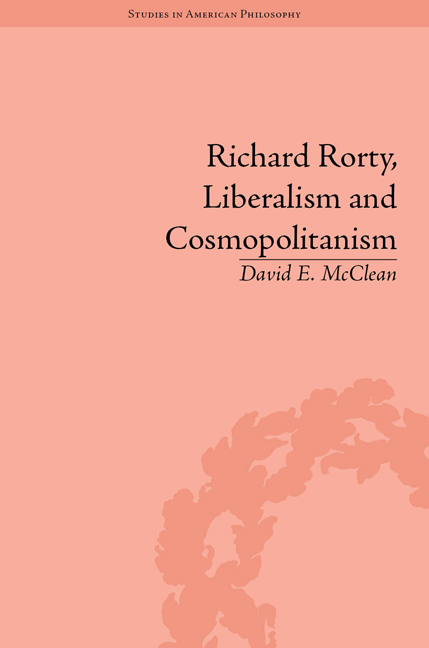Book contents
- Frontmatter
- CONTENTS
- Dedication
- Key to Works by Rorty
- Preface: Rorty's ‘Violence of Direction’
- 1 From Pragmatism to Rortyism
- 2 Alternative Utopias
- 3 Why Rorty Matters
- 4 Rorty on Religion, Race, Culture and Politics
- 5 Rorty and Cosmopolitanism
- Epilogue: Looking Forward to the Year 2096 with Cosmopolitan Hope
- Works Cited
- Notes
- Index
1 - From Pragmatism to Rortyism
- Frontmatter
- CONTENTS
- Dedication
- Key to Works by Rorty
- Preface: Rorty's ‘Violence of Direction’
- 1 From Pragmatism to Rortyism
- 2 Alternative Utopias
- 3 Why Rorty Matters
- 4 Rorty on Religion, Race, Culture and Politics
- 5 Rorty and Cosmopolitanism
- Epilogue: Looking Forward to the Year 2096 with Cosmopolitan Hope
- Works Cited
- Notes
- Index
Summary
The classical Pragmatists (Charles Sanders Peirce, William James, John Dewey, Josiah Royce and F. C. S. Schiller) made strenuous attempts to redirect philosophy away from its focus upon and concern with essences, epistemological certainty, and its obsessions with metaphysical puzzles. Dewey's Reconstruction in Philosophy is but one work that warned epistemologically-centred and metaphysically-fixated philosophy that it was travelling down a dead end, as did William James's Pragmatism: A New Name for Some Old Ways of Thinking (1907) (hereafter Pragmatism), and other of his writings. But these warnings and suggestions for reforms in philosophy (what I still think of as ‘Western’ forms, though I use the word loosely) are, in the works of the classical Pragmatists, perfuse and remarkably consistent. I will make references here to a few only, and rather than write yet another explication of portions of these texts (for there are many ready to hand already), and in view of the purposes of this book, I will quote from sections of them at length. This will, I believe, provide a reasonable sense of what Pragmatism, in the early years of its formation, was all about, as well as serve as a lead-in to how Rorty uses the Pragmatist tradition and then takes it in a rather novel direction which some call ‘neo-pragmatism’. This approach, I believe, will be the most efficient way to unpack and lay out the constellation of ideas that all Pragmatists (as far as I know) agree are the important features of Pragmatist philosophy.
- Type
- Chapter
- Information
- Richard Rorty, Liberalism and Cosmopolitanism , pp. 13 - 66Publisher: Pickering & ChattoFirst published in: 2014



